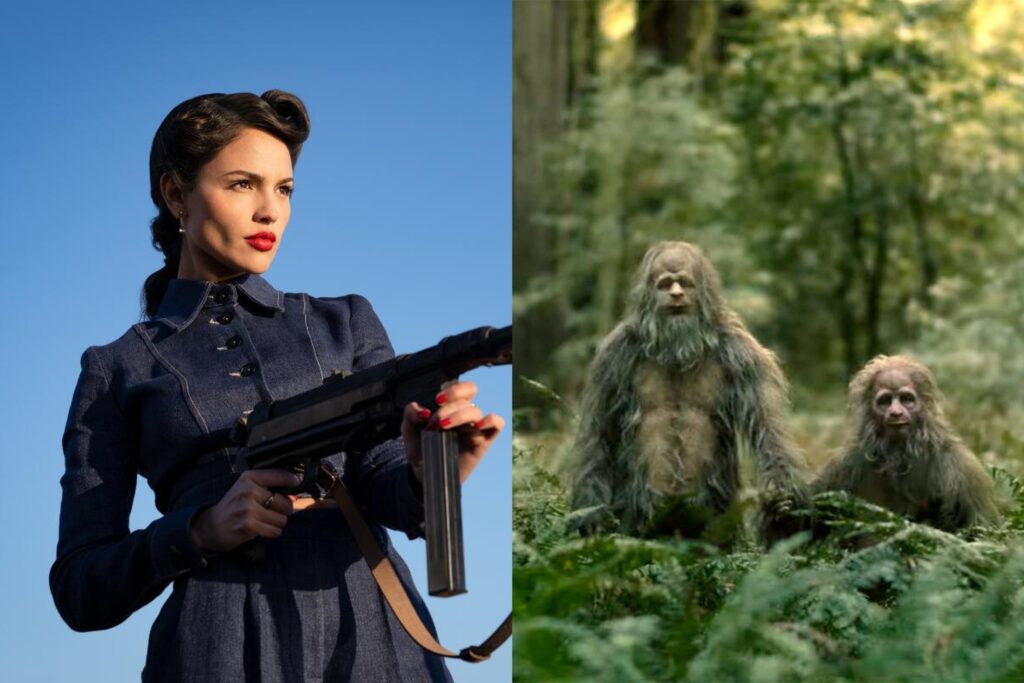
When it comes to intellectual property, cinema doesn’t operate in absolutes. There are great superhero movies and also terrible ones; there are great original movies and also terrible ones. Still, the franchise boom of the 2010s created an uneven playing field that lent a certain luster to smaller-scale films which weren’t rooted in comic books or young-adult literature. In fact, the continued survival of these types of pictures is what makes me confident that the medium isn’t on the verge of collapsing, despite the constant industry doomsaying about A.I. or tax write-offs or Netflix giving Zack Snyder a billion dollars to make seven different versions of an off-brand Star Wars rather than releasing any of its #content in theaters. The movies have been at death’s door ever since their birth over 100 years ago. They just never seem to die.
Currently, with the Marvel Cinematic Universe dwindling in dominance and audiences rewarding more ambitious storytelling like last year’s #Barbenheimer phenomenon, there seems to be an opportunity for studios to pivot away from the IP craze and toward more original movies. But again, the mere fact of a film’s putative originality doesn’t necessarily mean it’s, y’know… good. This past weekend featured two new releases that don’t feature masked heroes, magic wands, or talking animals. At last, real movies for adults! Except, well, suffice it to say that both have their flaws.
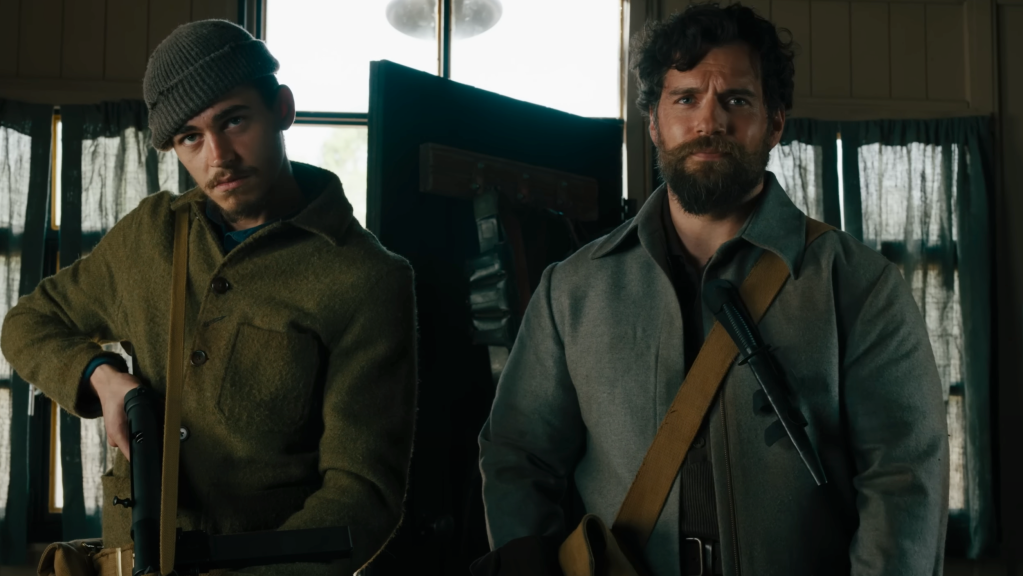
Technically speaking, Guy Ritchie’s The Ministry of Ungentlemanly Warfare isn’t an original movie at all; its screenplay, which Ritchie wrote with three others, is based on a non-fiction book by Damien Lewis. But it’s the type of picture that I tend to welcome—a self-contained story that doesn’t require a doctorate in any preexisting lore. In fact, it proudly announces its historical bona fides with its opening title card, claiming to chronicle real events as documented in newly declassified files from Winston Churchill (played here with bulldog efficiency by Rory Kinnear). This is both a declaration of veracity and a cheeky joke, given that what ensues is less a faithful reenactment than a live-action cartoon.
In bold strokes, Ministry is a platoon heist picture, like Saving Private Ryan by way of Ocean’s Eleven. It follows the exploits of a troop of soldiers carrying out the audacious, seemingly impossible assignment of disrupting the Nazi war machine by destroying a crucial supply vessel in Spain. As is typically the case, the particulars of the mission are less important than the participants charged with its execution. They include a roguish mastermind (Henry Cavill), a towering death-dealer (Alan Ritchson), an explosives expert (Henry Golding), a crafty navigator (Hero Fiennes Tiffin), and a guy who’s just sort of there (Alex Pettyfer). Joining this boys’ club is a beautiful actress (Eiza González) who, along with her cagey partner (Babs Olusanmokun), must infiltrate the Gestapo and lay the groundwork for the impending sabotage.
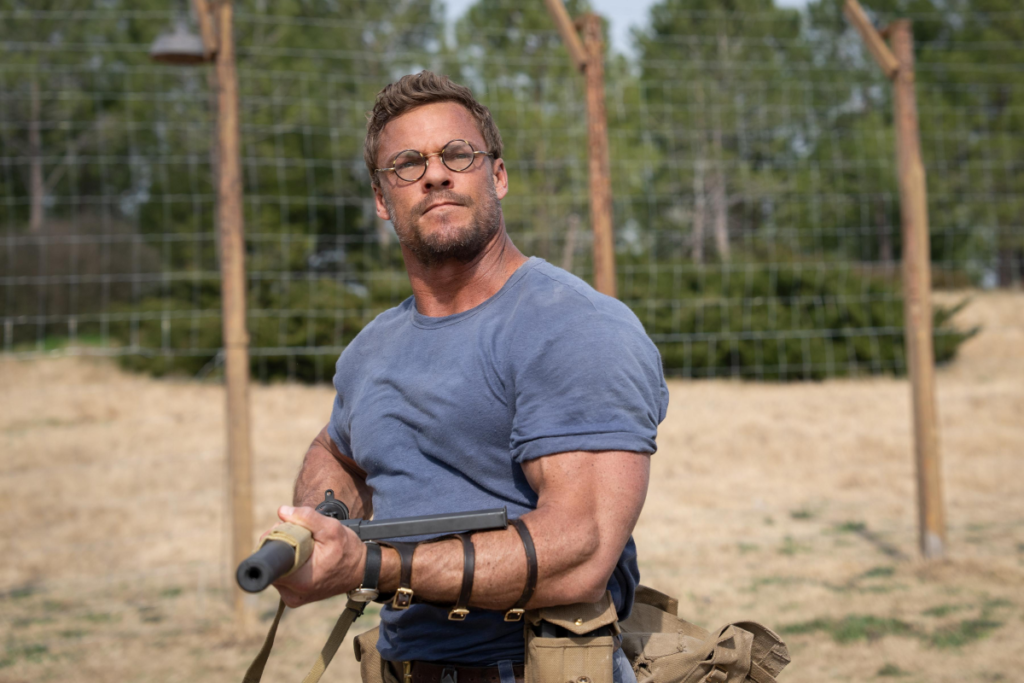
As a matter of history, Operation Postmaster (as the mission was called) was surely a noble and gritty enterprise, but under Ritchie’s stewardship, it’s more like an aggressively bloody party. Every now and then the director takes himself extremely seriously (see: Wrath of Man), but for the most part he prefers a tone of arch, frothy playfulness. Cavill, who collaborated with Ritchie in his breezy caper The Man from U.N.C.L.E., is a sensible choice for leading man, given that he’s inclined to undercut his imposing physicality with a permanent smirk. Ministry is full of massive men meting out justice at a lackadaisical remove; prior to one gory raid, they calculate that 60 unsuspecting Nazi goons nets out to 15 kills each, at which point Cavill’s leader admonishes Ritchson’s marauder, “Don’t get greedy.”
There is a measure of satisfaction to be found in such carefree bloodletting, though Ritchie’s approach to action here—in which his heroes repeatedly mow down anonymous foes with machine guns (plus the occasional bow and arrow)—is less amiable than indifferent. He’s more successful at spycraft, which he at least imbues with nominal tension to go with all the silky smoothness. González’s operative is naturally just as deadly with a rifle and a pistol (not to mention a grenade) as any of her male brethren, but the scenes where she seduces a loathsome SS commander (Til Schweiger) hum with a rhythmic precision that the rest of the movie disdains. (It doesn’t hurt that the costuming department has outfitted González in not one but two stunning dresses.)
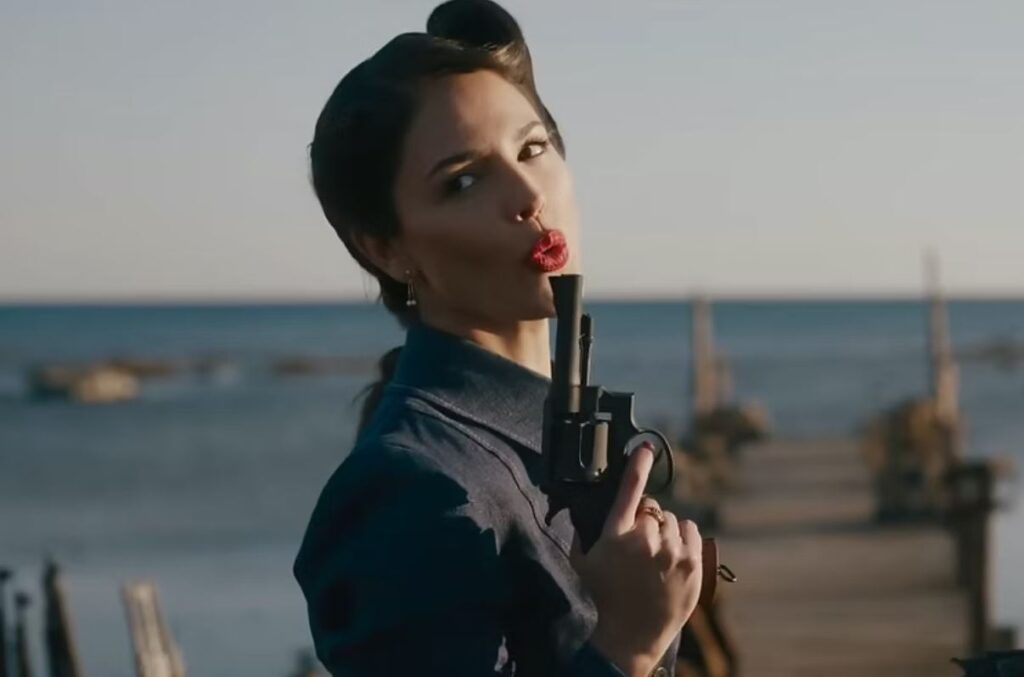
That mini-arc especially, and Ministry in general, bear a strong resemblance to Inglourious Basterds—a likeness that does Ritchie no favors. The Tarantino comparisons have dogged him throughout his career, but here he seems to actively court them, complete with a sequence where an undercover agent inadvertently tips their hand to an attentive Nazi. Movies ape their predecessors all the time, but while Ritchie plainly aspires to Tarantino’s oft-quoted brand—a mix of stylized dialogue and explosive violence—Ministry lacks both the incisive wit and, more distressingly, the formal tightness. The climax here, involving a hail of gunfire and a horde of minions, is dispiriting not because it’s derivative but because it’s lazy. The Ministry of Ungentlemanly Warfare may posture itself as an original spy thriller, but when it comes to cinematic excitement, it provides the same tedious, ineffectual mayhem we’ve seen countless times before.
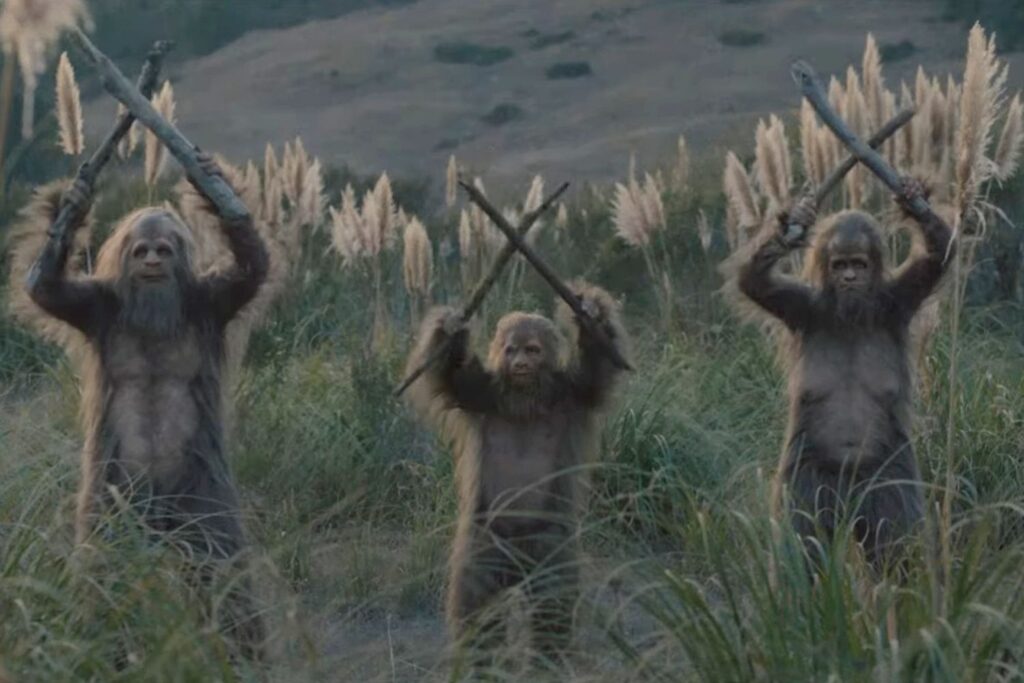
Last week’s other new release contemplates a more modest form of chaos, centering as it does on a nuclear family. The parents, played by Riley Keough and Nathan Zellner, enjoy one another’s company, even as they wrestle with the existential troubles of encroaching middle age. Their elder son (Jesse Eisenberg) seems content but somewhat aimless, while their younger child (Christophe Zajac-Denek) is preoccupied with the messy discoveries of puberty. Together, the four of them live a comfortable middle-class existence, even as they collectively long to deviate from their routine and broaden their social circle. Also, they’re all sasquatches.
Yes, Sasquatch Sunset, which Zellner directed with his brother David (who also wrote the script), is a movie about a bunch of bigfoots (bigfeet?). Thematically, it attempts to occupy a variety of different genres; at various times, it resembles a raunchy sex comedy, a stoner riff, an action thriller, and a character study of cultural displacement. Above all, though, it’s about four giant hairy beasts who roam the wilderness.
This is, to put it mildly, unusual. The Zellners, whose previous features include Kumiko, The Treasure Hunter and the underrated Damsel, have thrust upon themselves a peculiar cinematic challenge. Their task is to lend human shape and meaning to their characters’ misadventures without betraying their essential animality. They embrace this contradiction with a zeal that is both admirable and self-defeating. For the most part, Sasquatch Sunset is a victim of its own conceptual rigor. Spurning any temptations of accessibility—there are no explanatory voiceovers, no meta asides, no recognizable speech at all—the Zellners refuse to take the easy way out, which is another way of saying they make things awfully hard on themselves.
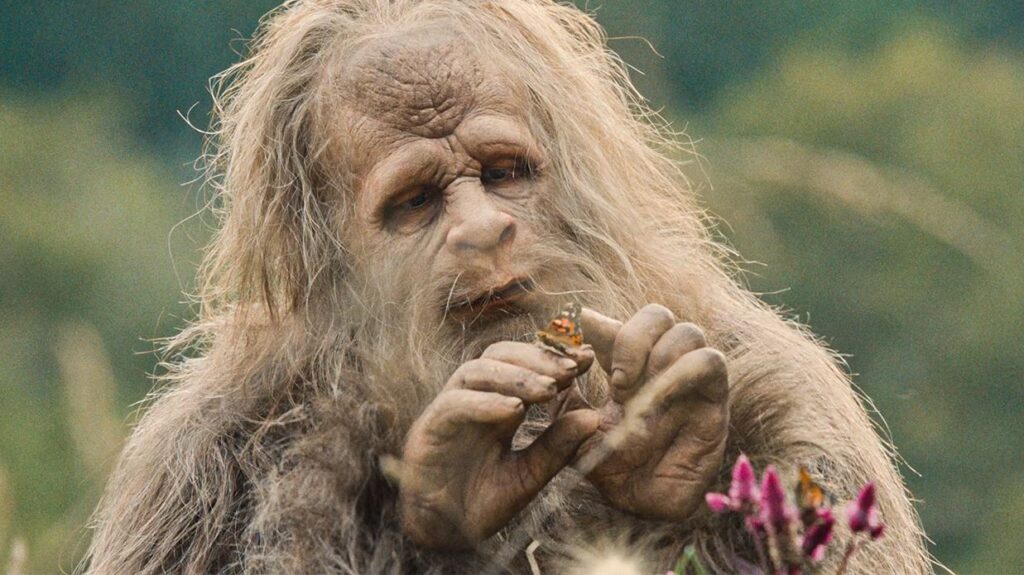
For its opening half-hour (the total runtime is a less-than-brisk 89 minutes), Sasquatch Sunset tries to function as an absurdist comedy. Here is a brief sampling of the various things it finds amusing: penises, acid trips, grunting, kids watching their parents have sex, turtles, feces, hangovers, masturbation, and creatures smelling their own farts. To be clear, this list of purported comic highlights is heavily abbreviated.
Lest I be accused of being a prude or a snob: Some of this is funny! During the scene when the sasquatches amble onto a paved roadway, only to be terrified by its vast openness, I laughed loudly, especially when they responded by marking their territory. (Naturally, the Zellners let this moment play on longer than they should, perhaps in an effort to pad their sketchy sketch material to feature length.) I also admired the physical commitment of the performers, even if the slabs of prosthetics prevent them from achieving any dimension; only Keough, with her brimming eyes and elemental wistfulness, manages to turn her brute into something resembling a character. (Speaking of which, Wikipedia informs me that Zellner and Eisenberg’s creatures aren’t related to the mother-son pairing; I’m unconvinced, and the screenplay certainly doesn’t try to clarify matters.)
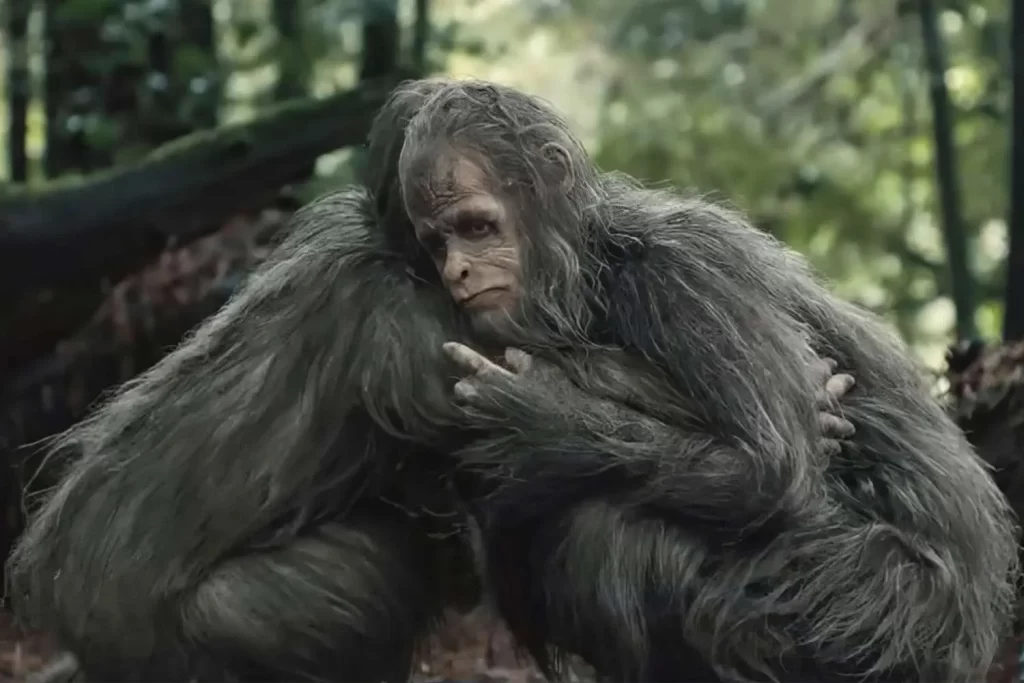
The first stretch of Sasquatch Sunset is its worst, as the Zellners take excessive pride in the oddity of their conceit—look, another shot of exposed genitals, ha!—without supplying any real humor or imagination. But after a key narrative development, the movie takes a surprising turn, and rather than bombarding us with its own strangeness, it acquires the shape of an actual story and even some kinetic momentum. The set piece where someone gets partially trapped under an immovable log would’ve fit right at home in The Revenant, while the sequence where the family discovers pop music is utterly hypnotic and unexpectedly moving.
Multiple times in Sasquatch Sunset, the titular beasts unite to deliver a sort of mating call, metrically cracking their clubs against the mighty trees. Sure, it’s just four furballs mashing their sticks and shouting into the air, but over time the ritual attains a certain beauty, along with a quiet sadness. I won’t pretend that this movie is emotionally wrenching, but it somehow achieves an elegiac quality, lamenting that the mythical civilization of its own invention is destined for demise. Ultimately, if The Ministry of Ungentlemanly Warfare is a canned remake in the guise of a novel venture, Sasquatch Sunset embodies both the risks and the rewards of truly original filmmaking. Sometimes, you’re stuck watching bigfoots sniffing their bodily fluids. And sometimes, those same animals become ambassadors for a whole new world.
Grades
The Ministry of Ungentlemanly Warfare: C+
Sasquatch Sunset: B-
Jeremy Beck is the editor-in-chief of MovieManifesto. He watches more movies and television than he probably should.
